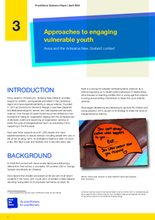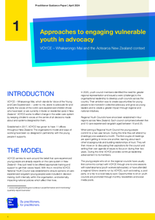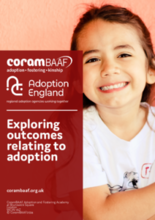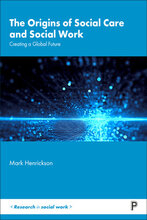Demographic Data
|
Sources: World Bank, UNDP, UNAIDS, DHS 2013 |
Displaying 181 - 190 of 14348
This practitioner guide outlines the Aviva program in Christchurch, Aotearoa New Zealand that provides support to children, young people and adults who have experienced family or sexual violenc
This practitioner guidance paper details the work of the VOYCE – Whakarongo Mai centres in New Zealand which centres its work around the belief that care-experienced young people are already experts on the care system – they just need to be offered appropriate training and support to get their voices heard.
This Literature Review was commissioned by Adoption England’s Regional Adoption Agency (RAA) Leaders’ Group to support practitioners in care planning for children. This summary document is for use by those directly involved in care planning, and also aims to potentially provide some support for those writing care plans and court reports for children needing permanency away from their family.
CarINg aims at helping girls and boys in the alternative care system (care leavers) become protagonists of their own future by making them feel part of a welcoming community.
Disability Rights International, as part of the Global Coalition on Deinstitutionalisation (GC-DI), organized a series of thematic workshop on the UN Guidelines on Deinstitutionalization, including in emergencies.
Bringing together interdisciplinary scholarship, Mark Henrickson argues that it is essential to understand and critique social work’s origins in order to work out what to retain and what must change if we are to achieve the vision of a truly global profession.
This study investigated social orphans through narratives of young people with experiences of growing up in institutional care in Latvia. The study uses the life histories of participants to explore the phenomenon of social orphans.
This retrospective, national-scale, observational e-cohort study of children entering care in Wales looked at the impact of cumulative risks of parental difficulties on the likelihood of care entry and the impact of the parent's sex.
Adopting a qualitative approach, this study gave voice to seven adoption applicants in Romania who began the adoption journey with one or more children but did not complete the legal process. The goal of the researchers was to understand their experiences throughout the adoption process and disruption. The present study is part of a larger research project that focused on the resilience of the adoptive family in Romania.
In Russia's Belgorod region, near the Ukrainian border, children are being evacuated by train after regional authorities announced 9,000 minors would be moved to other regions. The move follows weeks of deadly bombardment from Kyiv in the region, repeatedly targeted since Russia's invasion of Ukraine in February 2022.








